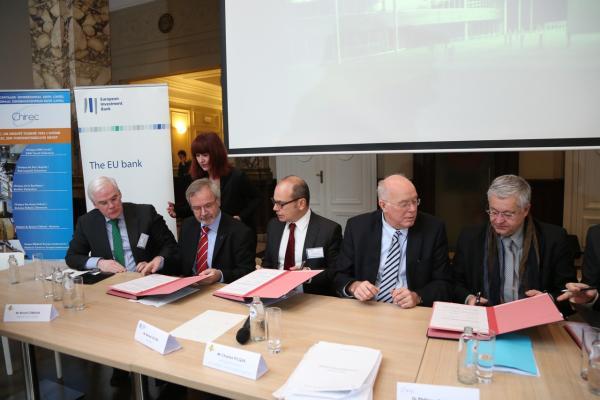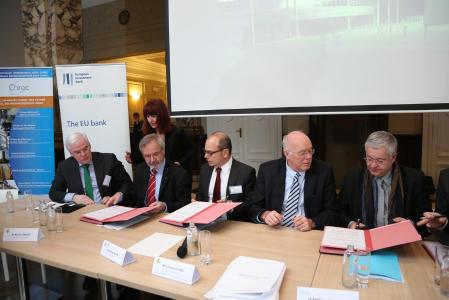
The European Investment Bank (EIB) is helping to finance the construction of a new sustainable hospital in Brussels. The finance contract was signed by the three partners (the EIB, COCOM and the Chirec Hospital Group). The work on the new hospital will commence in 2013 and be completed in 2017.
The new hospital, a passive building for the Chirec Hospital Group, will be built on the Delta site on boulevard du Triomphe in Auderghem. Chirec is a private group created from the merger of smaller hospitals in Brussels over the past 15 years. The Group is currently spread over four sites in Brussels and one in the Walloon Region.
Cost
The cost of the new hospital is estimated at EUR 282 million and will be financed by a EUR 50 million contribution from own funds, a loan from traditional banks (KBC, ING, Belfius, BNP Paribas) and EUR 100 million from the European Investment Bank. The European loan is expected to be for a term of 20 years.
COCOM will guarantee the amount borrowed from the EIB.
European Investment Bank
This is the first time that a hospital in Brussels has entered into a loan contract with the European Investment Bank. Providing finance for the construction of hospitals is part of its remit to support "human capital". Three hospitals are currently being examined by the EIB: one that comes under the Flemish Community, a second one in the Walloon Region and a third, the Chirec in Brussels, which comes under the Common Community Commission. Other hospitals could also seek a contribution from the EIB.
EIB President Werner Hoyer said at the signing ceremony: "I am delighted that the EIB is able to contribute to this major hospital project because of the benefits it will bring to patients, staff, the community and the Region. Brussels Capital will have a state-of-the-art establishment that, as well as helping to revitalise the area concerned and give the local economy a boost, will serve as an example in terms of energy efficiency and showing concern for the environment, which is also of crucial importance to our institution. In today’s Europe investment in human capital is a major driving force for growth and development, and we are glad to be able to support you in this initiative".
Why was it necessary to approach the EIB?
The financial crisis, which intensified during the summer of 2011 with the tension on the market over sovereign debt in Europe, has for a number of months been a source of concern for hospitals. The liquidity and refinancing constraints that are currently affecting banks have led most of them to cut back on lending or even to withdraw completely from the market. This has meant that for some months insufficient finance – both short and long-term – has been available to meet the needs of hospitals as a whole and that there has been an increase in the rates offered owing to the higher cost of access to liquidity and a reduction in the repayment periods for new loans. The prospect of new “Basel III” rules further limits the ability of banks to finance a sector which – despite the fact that investment is expected to contract – will still need to borrow substantial amounts, traditionally over long periods.
The Delta hospital project
Chirec currently operates hospitals on five different sites (four in Brussels and one in Walloon Brabant), as well as a medical centre in Brussels. The plan to bring the Brussels hospitals together on one site was conceived in 2006 after the infrastructure was found to be outdated and extending the hospitals was found not to be an option. In 2017, when the new hospital is due to open, Chirec will consist of hospitals on three sites (Delta, with 500 beds; Ste Anne/St Rémi, with 300 beds; and Braine-l'Alleud, with 300 beds) and a number of private hospitals, offering top-quality medical care locally in modern establishments.
Delta is ideally situated and easy to get to. The new building will have seven floors (two underground) totalling around 95 000 m² and will have room for 500 beds. The hospital was designed with patient comfort in mind and will be light and comfortable and easy to move around. The building’s functionality was studied in detail so that the doctors and all other members of staff will be able to enjoy the best possible working conditions.
According to Dr El Haddad, Chairman of Chirec’s Board, “With the signing of this agreement and thanks to Brussels Capital Region, COCOM and the various financial partners, Chirec will be able to undertake a large-scale project based on personalised medicine with an emphasis on the quality of the services offered to the patient, in a sustainable environment”.
The involvement of the Brussels Region and COCOM
For Minister-President Charles Picqué: “Providing a strategically located site for an activity that will contribute to the wealth of the urban economy of Brussels will enable the Region to put a sector that is essential to the future of Brussels on a sustainable footing. It will both maintain an activity that provides employment and, by concentrating healthcare facilities on one site, will make it possible to optimise the quality of the services provided. With this operation, the Region is also demonstrating its harmonious management of the area concerned to meet another crucial challenge, namely the growing population. In exchange for the Delta site, the Region will be able to develop on the Cavell site nearly 17 000 m2 of housing in a residential district that will no longer have to put up with the problems associated with having a hospital as a neighbour”.
“It is important to note that the use of this structure, i.e. the EIB loan backed by a COCOM guarantee, goes beyond the scope of the Chirec project alone and subsequent operations that are eligible for EIB loans in the Brussels Region will of course be able to benefit from it, which of course could be crucial in a context where commercial banks are withdrawing from long-term financing operations involving hospital-related and other types of infrastructure, in particular because of the increased capital requirements. This project can be considered to be a groundbreaking one”, commented Health Minister Benoît Cerexhe.
“Here we have a good example of sound hospital management”, as Minister Guy Vanhengel pointed out, “What is involved is bringing a group of hospitals together on one site, i.e. of rationalising the situation. This entails not only economies of scale, but also the possibility of reducing the number of traditional beds and increasing the number of daycare places. The site the new building will occupy is not only vacant but was also owned by the Brussels Capital Region. The new hospital will contribute to the provision of high-quality medical care in Brussels, a field in which, incidentally, Brussels excels, although this is often not sufficiently recognised.”
Mr Vanhengel also stressed that he supports all hospital groups, irrespective of ideological or philosophical considerations.

Photographer: Isopix ©EIB
Download original

Photographer: Isopix ©EIB
Download original

Photographer: Isopix ©EIB
Download original

Photographer: EIB ©To be defined
Download original

©CHIREC Group
Download original

©CHIREC Group
Download original

©CHIREC Group
Download original